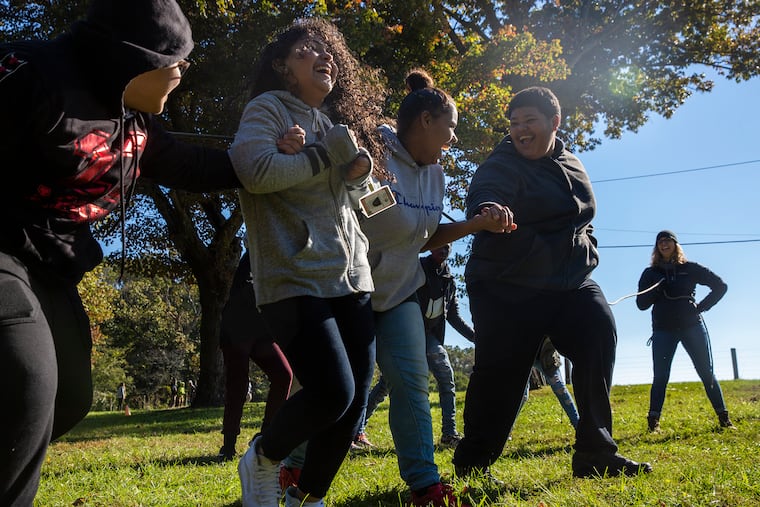To bolster academics, Philly schools turning to the outdoors
The Philadelphia School District has doubled down on its partnership with Outward Bound's Philadelphia arm, spending up to $340,000 annually so students can climb tall trees, take nature walks, and complete physical challenges in one- and multi-day expeditions, all in the name of social and emotional learning.

Robert Mitchell was 35 feet above the ground, suspended from harnesses and wires amid the tall trees of Wissahickon Valley Park, and he was terrified.
"I can't do this," said Mitchell, a ninth grader, shaking visibly.
Below him, a knot of his classmates from Penn Treaty High School — some of whom he knew a little, while others had been just faces in the hallway — encouraged him with shouts and claps to move forward on his Outward Bound ropes challenge. And from the tree to Mitchell's left came a voice strong and sure.
"I won't let you fall, bro," said Jose Naranjo-Betancourt, Mitchell's partner on the climb, tethered to him as they made their way up trees and across ropes together.
Increasingly, city students are having moments like these. The Philadelphia School District has doubled down on its partnership with Outward Bound's Philadelphia arm, spending up to $340,000 annually so students can climb tall trees, take nature walks, and complete physical challenges in one- and multi-day expeditions, all in the name of social and emotional learning.
Leaders believe it will have ripple effects, ultimately boosting academics, especially among high school freshmen, whom it has targeted for Outward Bound exposure since last school year.
Nationally, Outward Bound focuses on leadership, team building, and character development, primarily through outdoor experiences. The nonprofit works in 11 locations across the United States and has operated in Philadelphia for 25 years.
This school year, 1,400 district ninth graders will participate in Philadelphia Outward Bound School programs, with hundreds more in other grades also accessing programs. By next year, the majority of district ninth graders will have access to some sort of Outward Bound programming as the school system expands its ninth-grade academy model in an attempt to shore up graduation rates.
The idea is that by strengthening students' bonds, building their resilience, and exposing them to leadership-development opportunities, academic success will follow, officials said.
To Superintendent William R. Hite Jr., who has engaged in climbs, canoeing, and other Outward Bound activities with his own cabinet, expanding the program was an easy decision.
"It creates this deep sense of purpose — of taking care of your fellow students, of depending on them, of encouraging them," Hite said. "And it provides access to an outdoor experience that some of our children might not have otherwise."
After participating in an Outward Bound program, students reported themselves more likely to be leaders in their school, assist those who need help, believe in their ability to succeed, and take responsibility for their actions.
Researchers from the University of Illinois who study how young people develop motivation and resilience collected data from Philadelphia Outward Bound and echoed those conclusions in a January research paper produced for the program.
Nearly every student the researchers interviewed indicated significant learning from Outward Bound experiences.
"They described becoming more self-confident and developing skills for navigating interpersonal conflicts and personal struggles," the Illinois academics wrote. Students described making gains in compassion for others, communication and refocusing skills, positive mindset, and perseverance and grit.
On an autumn day so brisk that participants could see their breath in front of them, 26 Penn Treaty students and two school staffers boarded a school bus at their Fishtown school and made their way to the Wissahickon Valley spot, among the Philadelphia sites used by Outward Bound.
Over the course of almost six cell-phone-less hours, they found themselves out of their element in both ground-based problem solving activities and ropes courses, the students said. Most surprised themselves by loving it.
Lorraine Fortino, a biology teacher, was a skeptic before she accompanied Penn Treaty freshmen on a five-day canoeing expedition in the Delaware Water Gap last year. ("I don't sleep in tents," said Fortino, who lives in Philadelphia.)
But her group — both strong students and kids with behavioral and academic issues — thrived on the challenges in a way that translated into better overall attitude and school performance, said Fortino, who chaperoned new freshmen on the one-day experience recently.
"Initially, they think, 'What did I get myself into?'" she said. "Afterward, they walk away saying, 'I can do anything.'"
That's important for Philadelphia students, one-third of whom don't graduate from high school on time. (At Penn Treaty, where 90 percent of the students live below the poverty line, 73 percent graduate from high school in four years.)
Christine Liang, the college and career coordinator for Penn Treaty's ninth-grade academy, was new to the Outward Bound experience, but she thought it would do a world of good for her students.
"As soon as they feel like something's tough, they shut down," Liang said.
But in the Wissahickon, there were organic lessons about finding a way to meet and overcome challenges.
Mitchell and Naranjo-Betancourt conquered their partnered climb successfully, despite Mitchell's fears. Another classmate performed a solo climb blindfolded. Yet another thought she couldn't even make it up three rungs of the ladder in the solo climb. She managed six rungs, shaky but exhilarated, earning perhaps the loudest applause of the day.
Johnathon Malloy is scared of heights, but an Outward Bound instructor told him to just attempt the ropes course, and if he got really scared, to take one more step if he could.
Malloy made it, with cheers and high-fives from classmates and Fortino, all of whom acted as belayers — people who pull ropes to make the climb possible.
Malloy said everyone pitched in — even the people who stood on the ground, exerting tension on the ropes.
"I conquered my fear," Malloy said, a little incredulously. "We all had to work together."